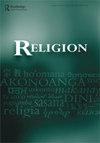Avenues of re-enchantment in Bulgarian mumming
IF 0.9
2区 哲学
0 RELIGION
引用次数: 0
Abstract
ABSTRACTWhile Bulgarians have purportedly been mumming since ancient times, the last 20 years have seen an increase of interest and participation in these multi-purpose rituals. The ‘revival’ has been accompanied by an increase of expressed belief in the efficacy of the rituals to exorcize evil and bring abundance. How can we account for this seeming re-enchantment? Following a brief description of the rituals, this analysis tracks three dynamics that have contributed to new expressions of belief: the impact of western postsecularism, the prior significance of ambivalence in how villagers related to the rituals, and widespread disenchantment with alternative programs for development and improvement. The article concludes with an examination of how these forces of re-enchantment articulate with a prior analysis of mumming as an expression of alternative modernity.KEYWORDS: Folk revivalbeliefpostsecularismambivalencepolitical economy AcknowledgementsI wish to thank the editors of this thematic issue, the three anonymous reviewers, and Michael Stausberg for insightful and helpful comments on previous versions of the manuscript. Special gratitude goes to Alessandro Testa, Agata Ładykowska and Viola Teisenhoffer, for inspiring me to wrestle with the notion of re-enchantment and including my efforts with theirs.Disclosure statementNo potential conflict of interest was reported by the author(s).Notes1 I use the term mumming for multiple reasons. While survakari and kukeri are used generically in Bulgarian for these rituals, participants in villages that do not use these terms sometimes resent being labeled as such. The other common Bulgarian option is ‘masquerade', which I sometimes use as well, but in English that term evokes the carnival-like qualities more characteristic of mumming festivals than the village practices I emphasize here. For the same reason I do not use the term ‘carnival' itself, or ‘games', which are also used in Bulgarian. Anglo-Irish mumming is not a perfect parallel either (see e.g., Glassie Citation1975; Sider Citation1976), but since the term is less common it does not evoke as many inappropriate preconceptions as the other English options. This is not a criticism of scholars who use these other terms as I also use them on occasion, it is just an explanation why I use the term mumming more often.2 This is not an exhaustive list (of either places or terms), and my objective here is not comparative. Some of these cases also evince elements of west European carnival traditions, while an excellent analysis by Ivo Strahilov (Citation2021b) points out the Ottoman/Turkish and Roma influences on Bulgarian mumming. All these challenge common nationalist characterizations of mumming customs, although the Bulgarian case is perhaps distinguished by the extent of contemporary enactments.3 This description is adapted from Creed (Citation2004). For more details and different analyses see the voluminous writings on mumming by Bulgarian anthropologists, ethnographers and folklorists (e.g., Fol Citation2004; Kraev Citation1996; Manova Citation2009; Stamenova Citation1982; Strahilov Citation2020, among many others).4 That it was unexpected points to our inadequate understanding of secularization, which several scholars have tried to correct (Asad Citation2003; Casanova Citation2006; Martin Citation2005).5 This village did not have a mumming tradition. Those that perform at Lent do know when Easter is, but perhaps because it affects the date of mumming.6 Testa (Citation2017, 23) found similar claims and connections in applications made to UNESCO by the Czech Republic. See also Christoph Brumann (Citation2014) on the expectation of continuity in heritage ‘belief'.7 I should note, however, that despite the imperative of belief for Christianity, Bulgarians are sometimes less than fulsome in expressing their Orthodox faith as well, which is more often assumed as part of national identity than attested or practiced (cf., Davie Citation2008). In general, some of the qualities and dynamics I describe for mumming could be applied to Orthodox Christianity in Bulgaria, but I will have to leave that comparison for another place.8 I am not the only anthropologist to make this choice. Indeed, anthropologists have debated whether belief is even an appropriate subject of study (see Needham Citation1972; Southwold Citation1979; Kirsch Citation2004). Many of the Bulgarian ethnographers and folklorists who study mumming don’t grabble with the issue either.9 Gail Kligman (Citation1981) documented a related progression for căluș rituals in Romania.10 Carol Silverman (Citation1983) describes a similar dynamic in the homogenization of Bulgarian folk music.11 Klaus Roth’s (Citation1990) discussion of socialist life-cycle rituals in Bulgaria provides an interesting comparison. Secular rites for marriage and christening met with a more varied reception, and in some places supplanted their Christian predecessors.12 Since Eisenstadt’s (Citation2000) offering of ‘multiple modernities,' different adjectives have been suggested from different disciplines and perspectives to emphasize particular dynamics and forces in the process (see e.g., Gaonkar Citation2001; Knauft Citation2002a). For the most part, these adjustments and refinements do not alter my claim about the concept’s relationship to re-enchantment.Additional informationNotes on contributorsGerald CreedGerald Creed is a Professor of Anthropology at Hunter College and the Graduate Center of the City University of New York. His research examines various dimensions of the postsocialist condition in Bulgaria, including religion/ritual, nationalism/populism, family/community and political economy.保加利亚木乃伊重获魅力的途径
虽然保加利亚人据说自古以来就有木乃伊,但在过去的20年里,人们对这些多用途仪式的兴趣和参与有所增加。伴随“复兴”而来的是越来越多的人表达了对仪式驱邪和带来富足的功效的信仰。我们如何解释这种表面上的重新着迷?在对仪式的简要描述之后,本分析追踪了促成信仰新表达的三个动态:西方后世俗主义的影响,村民如何与仪式相关的矛盾心理的先前意义,以及对发展和改善的替代方案的普遍觉醒。文章总结了这些重新着迷的力量是如何与木乃伊作为替代现代性表达的先前分析相结合的。致谢致谢致谢致谢致谢致谢致谢致谢致谢致谢致谢致谢致谢致谢致谢致谢致谢致谢致谢致谢致谢致谢致谢致谢致谢致谢致谢特别感谢Alessandro Testa, Agata Ładykowska和Viola Teisenhoffer,他们激励我与“重新着迷”的概念搏斗,并将我的努力与他们的结合起来。披露声明作者未报告潜在的利益冲突。注1我使用术语“奶妈”有多种原因。虽然survakari和kukeri在保加利亚被普遍用于这些仪式,但不使用这些术语的村庄的参与者有时会怨恨被贴上这样的标签。另一个常见的保加利亚词是“masquerade”(假面舞会),我有时也会用这个词,但在英语中,这个词让人联想到嘉年华般的狂欢节,而不是我在这里强调的乡村习俗。出于同样的原因,我没有使用“狂欢节”或“游戏”这个词,这些词在保加利亚语中也有使用。盎格鲁-爱尔兰木乃伊也不是一个完美的平行(例如,Glassie Citation1975;sidationcitation1976),但由于该术语不太常见,它不会像其他英语选项那样引起许多不适当的先入之见。这并不是批评那些使用其他术语的学者,因为我偶尔也会使用它们,这只是解释为什么我更频繁地使用“mumming”这个术语这不是一个详尽的列表(无论是地方还是术语),我在这里的目的不是比较。其中一些案例也显示了西欧狂欢节传统的元素,而Ivo Strahilov (Citation2021b)的一篇出色的分析指出了奥斯曼/土耳其和罗马对保加利亚木乃伊的影响。所有这些都挑战了普遍的民族主义对木乃伊习俗的描述,尽管保加利亚的情况可能因当代立法的程度而有所不同这个描述改编自Creed (Citation2004)。要了解更多细节和不同的分析,请参阅保加利亚人类学家,民族志学家和民俗学家关于木乃伊的大量著作(例如,Fol Citation2004;Kraev Citation1996;Manova Citation2009;Stamenova Citation1982;斯特拉希洛夫引文,2020,在许多其他)这是出乎意料的,这表明我们对世俗化的理解不足,一些学者试图纠正这一点(Asad Citation2003;Casanova Citation2006;马丁Citation2005) 5这个村子没有木乃伊的传统。那些在大斋节表演的人确实知道复活节是什么时候,但也许是因为它影响了木乃伊的日期Testa (citation2017,23)在捷克共和国向联合国教科文组织提交的申请中发现了类似的主张和联系。参见Christoph Brumann (Citation2014)关于遗产“信仰”的连续性的期望然而,我应该注意到,尽管信仰基督教是必要的,保加利亚人有时在表达他们的东正教信仰时也不那么夸张,这通常被认为是国家认同的一部分,而不是证明或实践(参见,david Citation2008)。总的来说,我描述的木乃伊的一些品质和动态可以应用于保加利亚的东正教,但我将不得不把这个比较留给另一个地方我并不是唯一一个做出这种选择的人类学家。事实上,人类学家一直在争论信仰是否是一个合适的研究主题(见李约瑟引文1972;位于Citation1979;Kirsch Citation2004)。许多研究木乃伊的保加利亚民族志学家和民俗学家也没有抓住这个问题不放Gail Kligman (Citation1981)记录了罗马尼亚cirucluu仪式的相关进展。Carol Silverman (Citation1983)描述了保加利亚民间音乐同质化的类似动态Klaus Roth (Citation1990)对保加利亚社会主义生命周期仪式的讨论提供了一个有趣的比较。世俗的婚礼和洗礼仪式受到了更多样化的欢迎,在某些地方取代了基督教的前身。 自从艾森施塔特(Citation2000)提出“多重现代性”以来,不同的形容词被从不同的学科和角度提出,以强调这一过程中的特定动态和力量(例如,Gaonkar Citation2001;Knauft Citation2002a)。在大多数情况下,这些调整和完善并没有改变我关于概念与重新结界关系的主张。作者简介:gerald Creed是亨特学院和纽约城市大学研究生中心的人类学教授。他的研究考察了保加利亚后社会主义状况的各个方面,包括宗教/仪式、民族主义/民粹主义、家庭/社区和政治经济。
本文章由计算机程序翻译,如有差异,请以英文原文为准。
求助全文
约1分钟内获得全文
求助全文
来源期刊

RELIGION
RELIGION-
CiteScore
2.70
自引率
0.00%
发文量
58
期刊介绍:
RELIGION is an internationally recognized peer-reviewed journal, publishing original scholarly research in the comparative and interdisciplinary study of religion. It is published four times annually: two regular issues; and two special issues (or forums) on focused topics, generally under the direction of guest editors. RELIGION is committed to the publication of significant, novel research, review symposia and responses, and survey articles of specific fields and national contributions to scholarship. In addition, the journal includes book reviews and discussions of important venues for the publication of scholarly work in the study of religion.
 求助内容:
求助内容: 应助结果提醒方式:
应助结果提醒方式:


